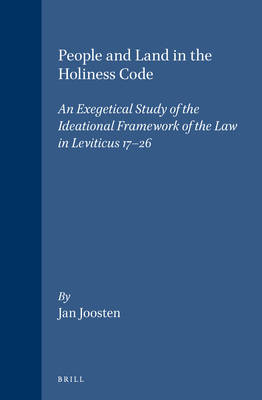
- Afhalen na 1 uur in een winkel met voorraad
- Gratis thuislevering in België vanaf € 30
- Ruim aanbod met 7 miljoen producten
- Afhalen na 1 uur in een winkel met voorraad
- Gratis thuislevering in België vanaf € 30
- Ruim aanbod met 7 miljoen producten
Zoeken
People and Land in the Holiness Code
An Exegetical Study of the Ideational Framework of the Law in Leviticus 17-26
Jan Joosten
€ 296,45
+ 592 punten
Omschrijving
This work proposes a reconstruction of the thought world underlying the Holiness Code (Leviticus 17-26). It focuses on the notions of people and land, which are central to the way the law is presented in this corpus. Important themes treated include the sons of Israel, the resident alien, the call to holiness, the camp in the desert and the land as the property of the Lord.
The conceptual universe of the Holiness Code is entirely dominated by the notion of the presence of the Lord in his sanctuary, in the midst of his people. It is this presence which requires the Israelites to observe holiness and confers upon the land its particular status.
The priestly conception of the relationship between God, people and land finds interesting parallels in the ideology of holy places evidenced in writings from the Ancient Near East.
The conceptual universe of the Holiness Code is entirely dominated by the notion of the presence of the Lord in his sanctuary, in the midst of his people. It is this presence which requires the Israelites to observe holiness and confers upon the land its particular status.
The priestly conception of the relationship between God, people and land finds interesting parallels in the ideology of holy places evidenced in writings from the Ancient Near East.
Specificaties
Betrokkenen
- Auteur(s):
- Uitgeverij:
Inhoud
- Aantal bladzijden:
- 240
- Taal:
- Engels
- Reeks:
- Reeksnummer:
- nr. 67
Eigenschappen
- Productcode (EAN):
- 9789004105577
- Verschijningsdatum:
- 2/12/1996
- Uitvoering:
- Hardcover
- Formaat:
- Genaaid
- Afmetingen:
- 166 mm x 245 mm
- Gewicht:
- 589 g

Alleen bij Standaard Boekhandel
+ 592 punten op je klantenkaart van Standaard Boekhandel
Beoordelingen
We publiceren alleen reviews die voldoen aan de voorwaarden voor reviews. Bekijk onze voorwaarden voor reviews.








